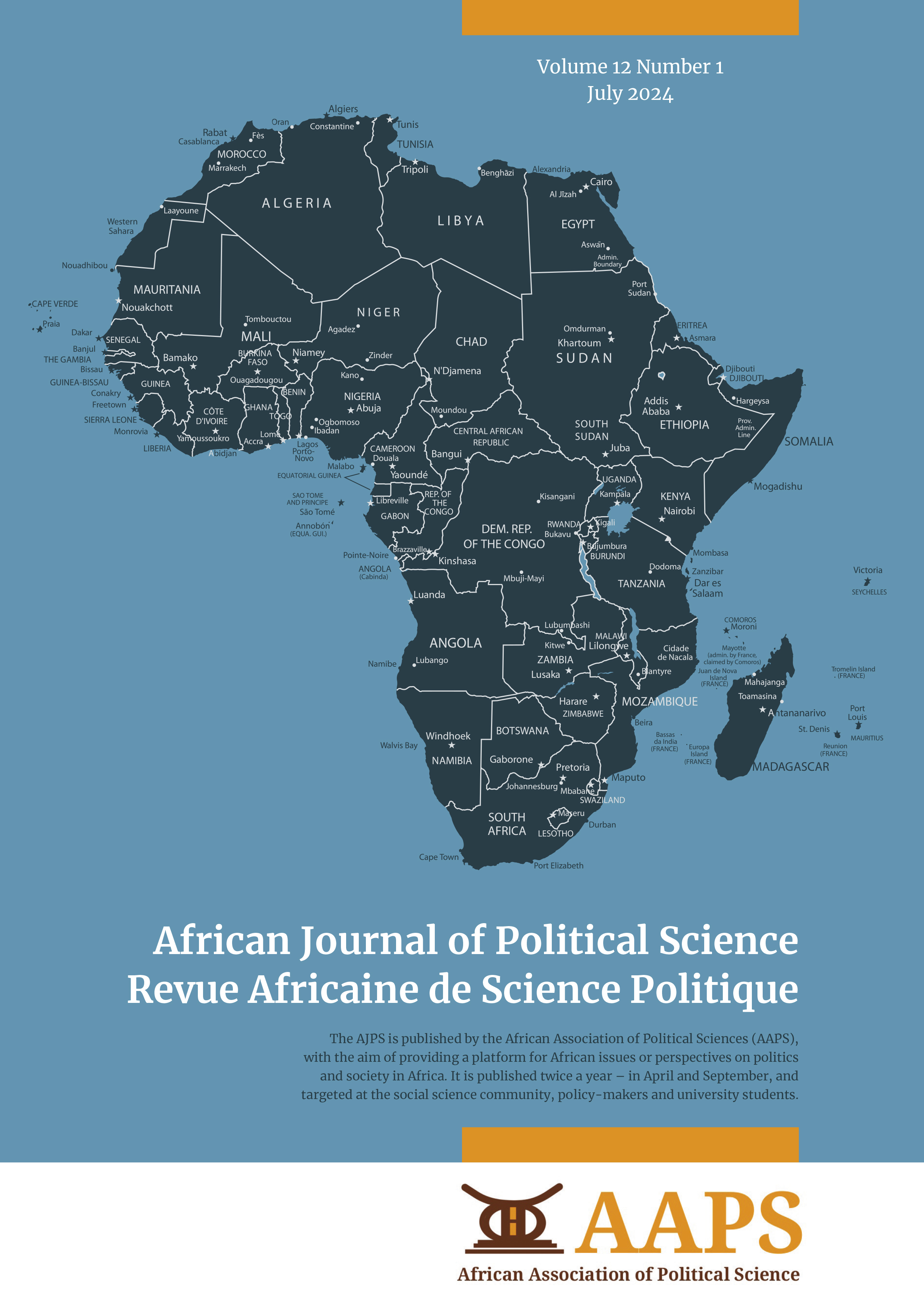Lived Poverty and the Fate of African Democracies
##plugins.themes.bootstrap3.article.main##
Keywords
Résumé
In comparative politics, economic development is a requisite to democracy (Lipset, 1959). Democracy is deemed to fail in less developed countries as poverty has proven to be detrimental to democratic performance. This study offers a perspective on the effects of poverty on the fate of democracy in Africa. Models are estimated for the Poverty-Democracy linkages using variables derived from merged Afrobarometer survey data (2002-2018). The results indicate that poverty in Africa has a mixed effect on democracy more generally. In particular, the analysis indicates that the experience of poverty, which we have termed ‘lived poverty’, has a negative effect on demand and supply of democracy as well as on a number of attributes of political participation. The fact that the poor demand democracy less than the well-to-do while at the same time perceiving limited supply of democracy, in our view explains why more African regimes are consolidating as hybrid regimes instead of moving towards democratic consolidation
##plugins.generic.articleMetricsGraph.articlePageHeading##
Références
Bourguignon, F., & Chakravarty, S. R. (2019). Multidimensional poverty orderings: theory and applications. In Poverty, Social Exclusion and Stochastic Dominance (pp. 143-166). Springer, Singapore. https://doi.org/10.1007/978-981-13-3432-0_10
Bratton, M. and Mattes, R. (2001). Africa’s Surprising Univeralism. Journal of Democracy, 12(1), 107-121. https://doi.org/10.1353/jod.2001.0002
Bratton, M. (2008). Vote buying and violence in Nigerian election campaigns. Electoral Studies, 27(4), 621-632. https://doi.org/10.1016/j.electstud.2008.04.013
Bratton, M. (2012). Trends in Popular Attitudes to Multiparty Democracy in Africa, 2000-2012. Afrobarometer Briefing Paper Series (Paper No. 105).
Bratton, M., & Van de Walle, N. (1997). Democratic experiments in Africa: Regime transitions in comparative perspective. Cambridge University Press. https://doi.org/10.1017/CBO9781139174657
Bratton, M., Mattes, R., & Gyimah-Boadi, E. (2005). Public opinion, democracy, and market reform in Africa. Cambridge University Press. https://doi.org/10.1017/CBO9780511617324
Diamond, L. (1992). Economic development and democracy reconsidered. American Behavioral Scientist, 35(4-5), 450-499. https://doi.org/10.1177/000276429203500407
Hagenaars, J. A. (1988). Latent structure models with direct effects between indicators: local dependence models. Sociological Methods & Research, 16(3), 379-405. https://doi.org/10.1177/0049124188016003002
Helliwell, J. F. (1994). Empirical linkages between democracy and economic growth. British Journal of Political Science, 24(2), 225-248. https://doi.org/10.1017/S0007123400009790
Joseph, R. (1997). Democratization in Africa after 1989: Comparative and theoretical perspectives. Comparative Politics, 29(3), 363-382. https://doi.org/10.2307/422126
King, E., & Van de Walle, D. (2007). Schooling, poverty, and disadvantage in the Lao People’s Democratic Republic in Lewis M. & Lockheed M (Eds.), Exclusion, Gender and Education: Case Studies from the Developing World. Washington, DC: Center for Global Development.
Krishna, A., & Haglund, E. (2008). Why do some countries win more Olympic medals? Lessons for social mobility and poverty reduction. Economic and Political Weekly, 143-151.
Kumlin, S. (2010). Book Review: Anirudh Krishna (ed.) Poverty, Participation, and Democracy: A Global Perspective Cambridge: Cambridge University Press, 2008, 189 pp. Acta Sociologica, 53(3), 293-295. https://doi.org/10.1177/00016993100530030704
Lindberg, S. I., & Lindberg, S. (2006). Democracy and elections in Africa. JHU Press. https://doi.org/10.1353/book.3263
Lipset, S. M. (1959). Democracy and working-class authoritarianism. American Sociological Review, 482-501. https://doi.org/10.2307/2089536
Lipset, S. M. (1959). Some social requisites of democracy: Economic development and political legitimacy. American Political Science Review, 53(1), 69-105. https://doi.org/10.2307/1951731
Lipset, S. M. (1963). The value patterns of democracy: A case study in comparative analysis. American Sociological Review, 515-531. https://doi.org/10.2307/2090068
Lipset, S. M. (1994, June). The state of American sociology. Sociological Forum, 9(2), 199-220. https://doi.org/10.1007/BF01476362
Lipset, S. M., & Bence, G. (1994). Anticipations of the Failure of Communism. Theory and Society, 169-210. https://doi.org/10.1007/BF00993814
Magnusson, B. A., & Clark, J. F. (2005). Understanding Democratic Survival and Democratic Failure in Africa: Insights from Divergent Democratic Experiments in Benin and Congo (Brazzaville). Comparative Studies in Society and History, 47(3), 552-582. https://doi.org/10.1017/S0010417505000253
Mattes, R. B., & Bratton, M. (2009). Poverty reduction, economic growth and democratization in Sub-Saharan Africa. Institute for Democracy in South Africa.
Minier, J. A. (1998). Democracy and growth: Alternative approaches. Journal of Economic Growth, 3(3), 241-266. https://doi.org/10.1023/A:1009714821770
Posner, R. A. (1997). Equality, wealth, and political stability. The Journal of Law, Economics, and Organization, 13(2), 344-365. https://doi.org/10.1093/oxfordjournals.jleo.a023387
Przeworski, A., Alvarez, M., Cheibub, J. A., & Limongi, F. (1996). What makes democracies endure? Journal of Democracy, 7(1), 39-55. https://doi.org/10.1353/jod.1996.0016
Przeworski, A., Alvarez, R. M., Alvarez, M. E., Cheibub, J. A., Limongi, F., & Neto, F. P. L. (2000). Democracy and development: Political institutions and well-being in the world, 1950-1990 (No. 3). Cambridge University Press. https://doi.org/10.1017/CBO9780511804946
Remmer, K. L. (1995). Review: New Theoretical Perspectives on Democratization. Comparative Politics, 28(1), 103-122. https://doi.org/10.2307/421999
Rosenstone, S. J. (1982). Economic Adversity and Voter Turn Out, American Journal of Political Science, 26(1) , 25-46. https://doi.org/10.2307/2110837
Sandbrook, R. (1996). Democratization and the implementation of economic reform in Africa. Journal of International Development: The Journal of the Development Studies Association, 8(1), 1-20. https://doi.org/10.1002/(SICI)1099-1328(199601)8:1<1::AID-JID285>3.0.CO;2-M
Sandbrook, R. (1996). Transitions without consolidation: democratization in six African cases. Third World Quarterly, 17(1), 69-88. https://doi.org/10.1080/01436599650035789
Van de Walle, N. (2002). Elections without democracy: Africa’s range of regimes. Journal of Democracy, 13(2), 66-80. https://doi.org/10.1353/jod.2002.0032
Kapstein, E. B., & Converse, N. (2008). Poverty, inequality, and democracy: Why democracies fail. Journal of Democracy, 19(4), 57-68. https://doi.org/10.1353/jod.0.0031
Isaksson, A. S. (2014). Political participation in Africa: The role of individual resources. Electoral Studies, 34, 244-260. https://doi.org/10.1016/j.electstud.2013.09.008
Mattes, R., Bratton, M., & Davids, Y. D. (2002). Poverty, survival and democracy in Southern Africa.
Tambe, E. B. (2017). Electoral participation in African democracies: The impact of individual and contextual factors. Commonwealth & Comparative Politics, 55(2), 119-140. https://doi.org/10.1080/14662043.2017.1274868


